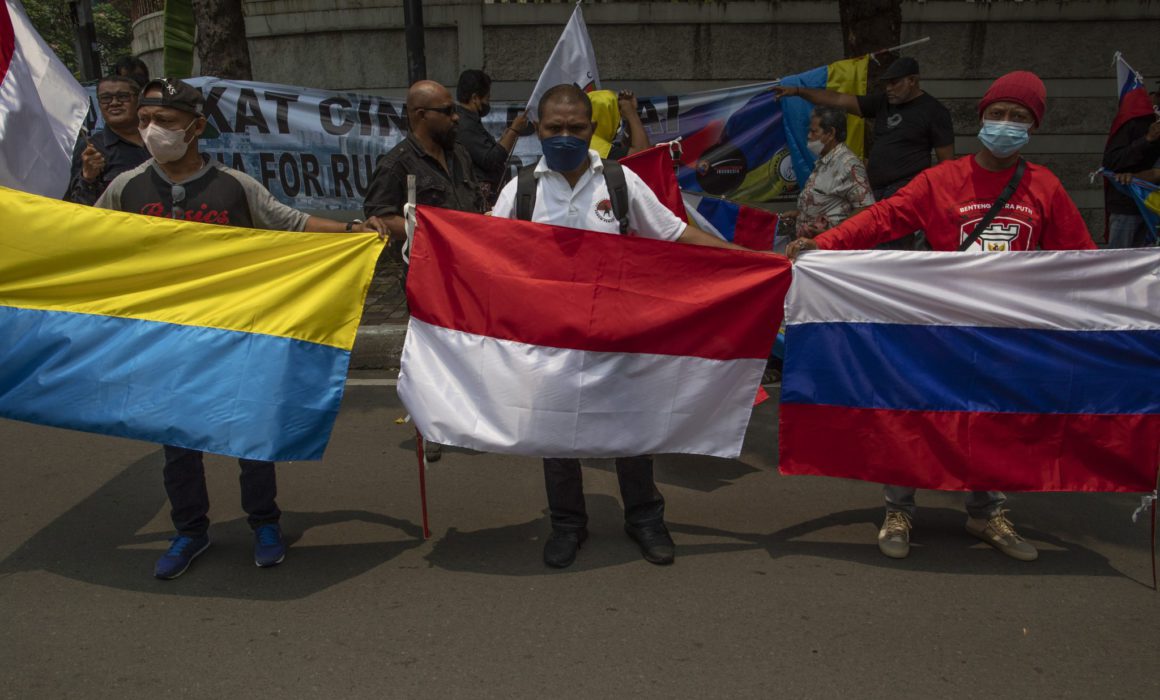The Russia-Ukraine conflict: what are the impacts on Indonesia?
Written by Lotte Troost – AIYA National Blog Editor
Indonesian translation by Gabriella Pasha – AIYA National Translation Team
It has been more than 118 days since Russian troops began invading Ukraine. Although Ukrainian counter offensives have forced back Russian troops from the Ukrainian capital Kyiv, the border areas in the southern and eastern parts of the country are still under heavy attack, and the fighting there does not seem to lessen anytime soon.
The war in Ukraine is not just affecting the two countries battling on the ground; it is also impacting countries all over the world, despite many of them being geographically far from the actual battleground. Indonesia is one of these countries.
Noodle crisis, cooking oil shortages and general inflation
Ukraine is also known as the granary of Europe. When it comes to wheat, Indonesia buys the majority of its imported wheat from Ukraine. In 2020, Indonesia imported 2.96 million tons of wheat from Ukraine. Although wheat isn’t Indonesia’s staple food, it is used to make one of the country’s most popular local cult foods; Indomie noodles. With over 15 billion packets of Indomie produced annually, you can imagine that considerably reduced activity in Ukrainian ports due to the war has had a significant effect on the supply of wheat around the globe, which has impacted the availability of noodles in countries on the other side of the world, including Indonesia.
You may have seen photos of Indonesians queueing to buy cooking oil. That situation is also an effect of the war. Ukraine exports more sunflower oil than any other country in the world. And the world’s second-largest supplier is Russia, accounting for about 23% of global supplies. With export activities of these two main suppliers being heavily disrupted by their war, demand for an alternative type of cooking oil, which is palm oil, soared. In Indonesia, palm oil is the most popular cooking oil, used to fry the many types of gorengan. Due to increased global demand, Indonesians have seen the price of palm oil skyrocketing. Between April and May, the Indonesian government even imposed a restriction on palm oil export to ensure domestic consumption.
Local villagers in Kendari, South Sulawesi, lining up to buy cooking oil for an unusually high price of IDR 70,000 per litre. Photo by Antara.
In addition to the noodle crisis and cooking oil shortages, the supply of crude oil to the international market has been disrupted, with Russia being the world’s second-largest supplier of crude oil after Saudi Arabia. In response, Indonesian state-owned gas and oil company Pertamina has increased the price of non-subsidized Pertamax fuel from IDR 9.000 to IDR 12.500 per litre.
Disrupted global supply chains and rising commodity prices have resulted in (long-term) inflation, which comes on top of the inflation caused by the pandemic. According to a June report from Statistics Indonesia (BPS), annual inflation rose to 3.55 percent in May, the highest inflation rate since December 2017.
Moving forward: the Bali G20 Summit as a venue for peace negotiations?
In November 2022, all eyes will be on the 17th Group of 20 (G20) Heads of State and Government Summit, which will be held in Bali under Indonesia’s presidency. Russian President Vladimir Putin has confirmed his G20 attendance, although several Western member states have urged Indonesia to reject Putin’s presence in Bali. Earlier in April, the United States, Canada and the United Kingdom walked out of a meeting of the Group of 20 major economies (G20) when a Russian delegate began to speak.
Opening ceremony of the G20 finance ministers and central bank governors meeting in Jakarta, February 2022. Photo by Reuters.
While Indonesia attempts to exude neutrality as a G20 host, in line with the country’s foreign policy in general, it appears that they can no longer take such a stance. As a host, Indonesia has the authority to invite leaders from non-member states as observers. This actually happened in April, when President Jokowi invited Ukrainian President Volodymyr Zelensky to attend the G20. During a live virtual event hosted by the Foreign Policy Community of Indonesia (FPCI), Zelensky accepted that invitation.
With these happenings in mind, several scenarios could unfold during the upcoming G20 Summit in Bali. One of these is that the conflict will become the central focus of the summit rather than Sustainable Energy Transition, Global Health Architecture and Digital Transformation, which are now set by Indonesia as the three main pillars of the summit. Member states might walk out again, as happened earlier in April or in 2014 when Australia held the G20 presidency and Putin left the Summit in Brisbane earlier after being reprimanded by other member states for his support of separatists in eastern Ukraine. Another scenario is that the 2022 G20 Summit in Bali will become the stage of peace negotiations and prelude the start of the end of the war. In less than five months, we will know more.

